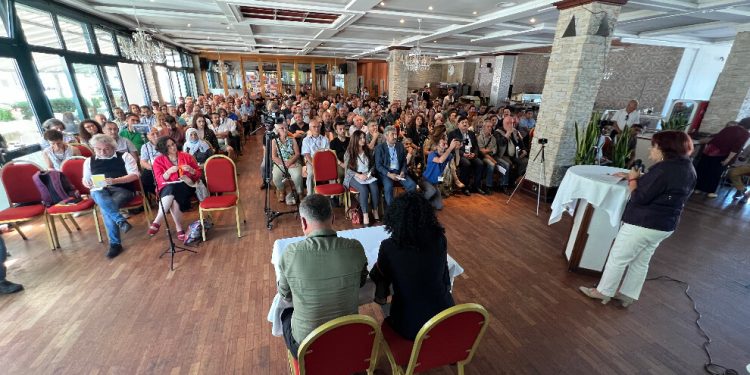NEWS CENTER – Within the scope of the decisions of the “Second Democracy and Freedom Conference” held in Berlin, the Capital of Germany, the “Democracy and Freedom Forum” is held in the Zurich Canton upon the call of 44 intellectuals and politicians living in Switzerland. The representatives of Kurdish, Assyrian, Armenian, Yazidi and Alev, opposition parties and various non-governmental organizations living in Switzerland attended the forum. The first of the Democracy and Freedom Conference was held on September 21-22, 2019, and the second was held on March 5-6, 2022.
The Forum started with the screening of the cinevision prepared with the slogan “We Call to the Future”. Author Elif Yıldırım and Kurdish politician Necdet Atalay moderated the forum. Yıldırım and Atalay greeted the participants in different languages and explained the preparation process of the forum in Switzerland. The forum was held in 3 sessions. In the first session, Professor Neşe Özgen and Journalist Can Dündar gave a short speech on the debates and decisions in Berlin.
Noting that the damage assessment was done at the meeting in Berlin, Professor Neşe Özgen emphasized that the way out and the construction of the future were discussed later. She stated that what was done in the past was discussed, but there were deficiencies in discussing the future, and said:
“We need to design together what we are going to do. Everyone agreed that none of the ways that were tried before at the conference would be tried anymore. This is very important. Everyone expressed their determination to seek a new path and build a new future. Will we be with our likes or dissimilars on this path? We’re done with this discussion. We will act together with our likes and dissimilars. While defending victimization, we decided that the state should not be shown as strong.”
Özgen finally called on everyone to participate in the forum to be held today and express their thoughts.
Journalist Writer Can Dündar, who took the floor later, drew attention to the participation of many different segments of the conference in Berlin. Stating that the participants are the photographs of the pain in Turkey, Dündar said that the Şenyaşarlar family, families who lost their children in Gezi, Bosphorus Solidarity, Saturday Mothers, Kaz Mountains Initiative, Peace signatories, Solidarity with Prisoners Initiative, Alevi Associations Federation, Trustee Co-Mayors, and Statutory Decrees People who lost their jobs, Respect for the Dead and Justice Solidarity, participated.
Mentioning that Turkey is going through a process where there is a need for organization in order to respect the dead, Dündar used the following expressions:
“We are children of the same pain. We must put aside our identity, our beliefs, and concentrate on the pain that unites us. We need to unite and get through this pain.”
SECOND SESSION
In the second session, the subject of “Reconstruction” was discussed. The moderators of the session were Yurdusev Özsökmenler, the former Mayor of Bağlar, and Tuncay Yılmaz, Founding Co-Chair of SYKP. In this session, CHP Istanbul Deputy Sezgin Tanrıkulu, Swiss Federal Council Member Sibel Arslan, Lawyer Mahmut Şakar, European Syriac Union Representative Elbert Shleyman Rhavi, Social Scientist Dr. Nil Mutluer and Former KESK Co-chair Lami Özgen made speeches.
CHP Istanbul Deputy Sezgin Tanrıkulu participated in the forum via video conference and expressed his thoughts. Tanrıkulu noted that everyone should explain what they planned in the second century of the Republic. Reminding that the CHP issued a statement at the congress, Tanrıkulu emphasized that everyone should present a concrete framework for Turkey to establish peace and democracy within the parliamentary system.
Lawyer Mahmut Şakar also stated that there is an infrastructure that constitutes the AKP government and said, “If the AKP leaves, the factors that make up its infrastructure must be removed. Turkey’s most burning problem is war. There should be concrete proposals on how to end this war. There are examples in the world of how such conflictual processes ended. These should be taken as a basis,” he said.
Swiss Federal Assembly Member Sibel Arslan also shared information on the legal system and administrative management in Switzerland. Arslan emphasized that he can benefit from the political ground in Switzerland for a political change that may take place in Turkey.
Speaking on behalf of the European Assyrians Union, Elbert Shleyman said that the Turkish state added new ones to the massacres carried out by the Ottoman state. He stated that the Turkish state has historically tried to assimilate differences and put pressure on them since the day it was founded. Shleyman pointed out that Assyrians’ properties and properties were confiscated and their intellectuals were murdered, adding that the suffering of the peoples should not be forgotten for a new construction.
Social Scientist Nil Mutluer stated that there is a street resistance in Turkey and despite all the pressures, this is seen in daily life. Pointing out that it should be based on issue politics rather than identity politics, Mutluer said, “Identities had many problems. So identity politics was a necessity. However, this situation has been exceeded. That’s why it should focus on policies based on common problems,” he said.




